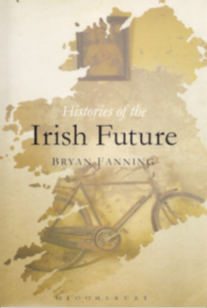Histories of the Irish future
Published in Book Reviews, Featured-Book-Review, Issue 4 (July/August 2015), Reviews, Volume 23Reviewed by Maurice Coakley
Maurice Coakley lectures in journalism and media studies at Griffith College, Dublin
 What can the past teach us? Professor Bryan Fanning had the idea of examining the work of a dozen authors from the seventeenth century to the 21st to better understand Ireland’s current predicament and possible futures. This had the potential to be an interesting work.
What can the past teach us? Professor Bryan Fanning had the idea of examining the work of a dozen authors from the seventeenth century to the 21st to better understand Ireland’s current predicament and possible futures. This had the potential to be an interesting work.
Much of the book is unexceptional. It is striking, however, that the relationship between Britain’s colonisation of Ireland and its wider imperial project is barely discussed. It is not the only significant factor omitted. There is no engagement with Tone or Stephens or Davitt. The Irish republican democratic tradition is written out of Fanning’s interpretation of history. The central place goes instead to John Mitchell, the romantic nationalist writer who played a prominent role in the Young Ireland movement. This is despite the fact that the Young Irelanders had far less historical impact than the United Irish movement, the Fenians or the Land League.
There is a chapter on Connolly, in which he is chided for abandoning his socialist politics and throwing in his lot with ‘backward-looking’ nationalists like Pearse in 1916. The wider crisis of European socialism—which has never quite recovered from the Great War—merits no discussion. Neither is any consideration given to how the Easter Rising was perceived in the colonised world. It is curious that an academic who shows little commitment to socialist ideas should admonish a socialist revolutionary for abandoning his socialist politics by joining an anti-imperialist revolt.
Not a single Ulster writer merits a chapter. Northern Irish history, and the Northern Irish conflict, is presented to the reader through a discussion on the work of Conor Cruise O’Brien and his ‘lonely passion’. By not directly engaging with any Northern writer, Fanning avoids having to explore the origins or specific dynamics of the Northern Irish conflict, or the role played by the British state within it. Instead, like with so many Southern Irish writers, the Northern conflict is presented as a morality play handed down to us by the gods to assist the citizenry of the Republic to distinguish the good, the decent and the moderate from the mad, bad and dangerous.
The significance of the exclusion of the republican democratic tradition becomes apparent in the book’s concluding chapter. For Fanning, the influence of an essentially conservative romantic nationalism was the crucial obstacle to progress in Ireland. The 1932 Fianna Fáil government, he tells us, was ‘elected on a platform of economic isolationism’. Only in the 1950s did we see an ‘economic nation-building programme of modernisation’. As a matter of historical fact, following their election in 1932 Fianna Fáil sought to introduce a programme of industrialisation through import-substitutionism, as did many other developing countries. They also established a range of semi-public bodies encouraging development. In this decade of depression, industrial employment rose significantly. More than that, in their first decade in office they launched a programme of public housing, building on average 12,000 houses a year.
The 21st century is seen through the prism of Fintan O’Toole, with whom Fanning seems to share not only an intellectual affinity but also a style of writing, including a tendency to ramble. Readers of the Irish Times will be familiar with O’Toole’s core argument that most of Ireland’s problems flow from the country’s incomplete modernisation, exemplified by its cultural backwardness. Fanning has no quarrel with this. He recounts at length O’Toole’s tales of corruption in contemporary Ireland, but nowhere in either author’s writing is there any sense that this corruption is unexceptional. Anyone paying attention to political events across Europe and North America will be aware that political corruption is ubiquitous. In France, Germany, Britain, Spain and Italy major political figures have been publicly exposed for engaging in corrupt practices. The US electoral system has gone furthest to institutionalise corruption: nobody there achieves high office without large corporate donations.
That O’Toole is sometimes seen as a radical thinker says a lot about the narrow range of political opinion permitted in the Irish media. In truth, his ideas are fairly conventional. Nowhere does he discuss the dynamics of capitalism as a social system or the hierarchal structures of global power. Specifically, there is little or no discussion in either author about ‘financial capitalism’ or, as it is sometimes called, ‘financialisation’. But as writers like Conor McCabe and Seán Ó Riain have shown, the liberalisation of global finance (and especially of European finance) played a crucial background role in the recent Irish financial crisis. The insularity of reference of both Fanning and O’Toole is quite striking.
A character in one of Wim Wender’s films remarked that the Americans have colonised our subconsciousness. In the case of O’Toole and Fanning, it seems that not only their subconsciousness has been colonised but their consciousness as well. Modernisation theory gets swallowed unthinkingly. The notions of progress, backwardness and modernity that they hold so dear go unexamined.
Shortly before his premature death, Peter Mair—Ireland’s most internationally renowned political scientist—argued that the European Union had morphed into a deeply undemocratic political order that was overruling elected national governments to impose neo-liberal policies across Europe. These newly empowered EU institutions have no political legitimacy, but this does not seem to concern Europe’s political leaders. While O’Toole and Fanning noticed the arrival of the Troika, they show little awareness of these wider changes or their likely consequences. For anyone wanting to understand the future, this might be a good place to start.
















